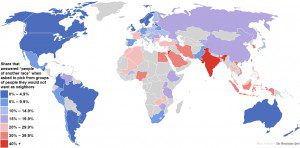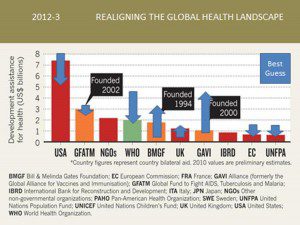Here is your Thursday Morning Linkage. I’m going to start off with my usual conservation theme before turning to some other topics like a kerfuffle over mapping racial tolerance and the World Health Assembly (going on this week).
- Amphibians are in trouble all across the U.S. and world (disease, climate change, farm chemicals), along with bees and bats, nature is trying to tell us something
- Chinese bear bile farms are generating an uproar – in China!
- Fish have been moving to cooler water for decades in reaction to climate change
Did you see the cross-national map of racial tolerance that lit up the blogosphere with back and forth?
- Max Fisher writing for the Washington Post posts a map of cross-national attitudes towards racial tolerance based on the World Values Survey
- Critics question (“the cartography of bullshit“) whether race can be measured cross-nationally, find errors, and hammer Fisher for being a public intellectual
- Drezner and Ulfelder think the critics go overboard
- Saideman weighs in, wonders about a single metric to gauge races and what the questions actually ask
- Aba Muqawama ponders the perils of data journalism
In other news, the World Health Assembly is meeting this week and Laurie Garrett is on it in a two parter (I, II) , for how the World Health Organization is trying to handle a very limited budget, big dreams for global health, lots of money tied up in infectious diseases, and a new big pushes for action on health systems and non-communicable diseases like diabetes.
Joshua Busby is a Professor in the LBJ School of Public Affairs at the University of Texas-Austin. From 2021-2023, he served as a Senior Advisor for Climate at the U.S. Department of Defense. His most recent book is States and Nature: The Effects of Climate Change on Security (Cambridge, 2023). He is also the author of Moral Movements and Foreign Policy (Cambridge, 2010) and the co-author, with Ethan Kapstein, of AIDS Drugs for All: Social Movements and Market Transformations (Cambridge, 2013). His main research interests include transnational advocacy and social movements, international security and climate change, global public health and HIV/ AIDS, energy and environmental policy, and U.S. foreign policy.



0 Comments